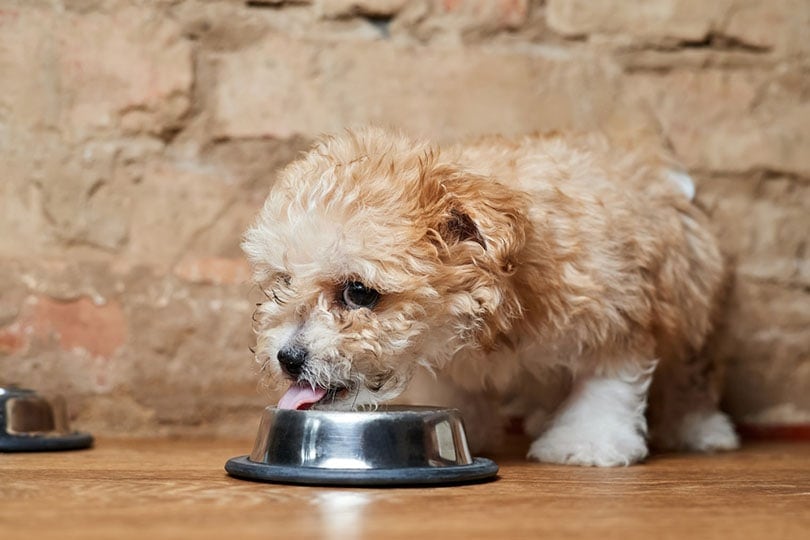Goat Milk for Dogs: 9 Vet-Approved Benefits
Updated on
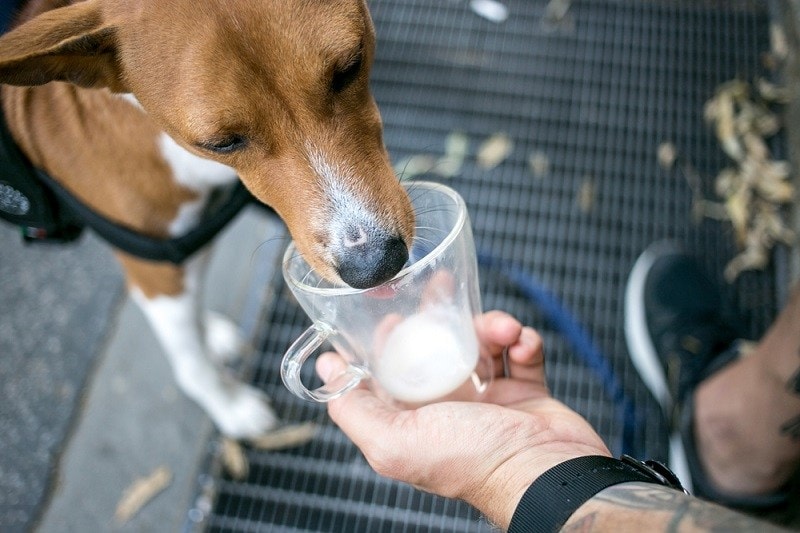
Click to Skip Ahead
Did you know that goat milk is the most consumed milk in the world? Despite what the “Got Milk?” ads from the 90s tried to convince us, it’s true; over 65% of the world prefers goat milk over cow milk. If you’re making the switch yourself, you might wonder if goat’s milk is okay to offer your pup occasionally.
Goat’s milk can be a tasty treat for your dog, but it’s not something you should offer in excessive amounts. As with anything relating to diet, moderation is key.
Read on to learn more about offering goat milk to your dog, including nine science-backed benefits and the risk associated with goat milk.
What Is Goat’s Milk?
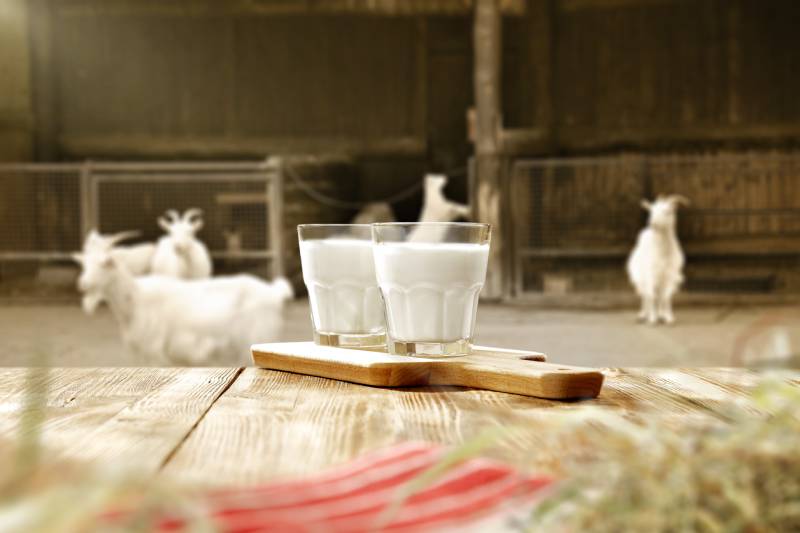
Goat milk comes from domestic goats. While it’s similar to cow’s milk, the two have some key differences.
- Contains more protein
- Contains more fat
- Has fewer carbs
- Has less lactose
- Contains more calcium
The 9 Goat Milk Benefits for Dogs
1. It Contains Probiotics
Goat’s milk naturally contains probiotics, the good bacteria in the digestive tract. Billions of these bacteria live in the gastrointestinal system of dogs and work hard to balance the internal environment to prevent disease. Probiotics are necessary to maintain the optimal microbial balance in the gastrointestinal tract, improving digestion and nutrient absorption.
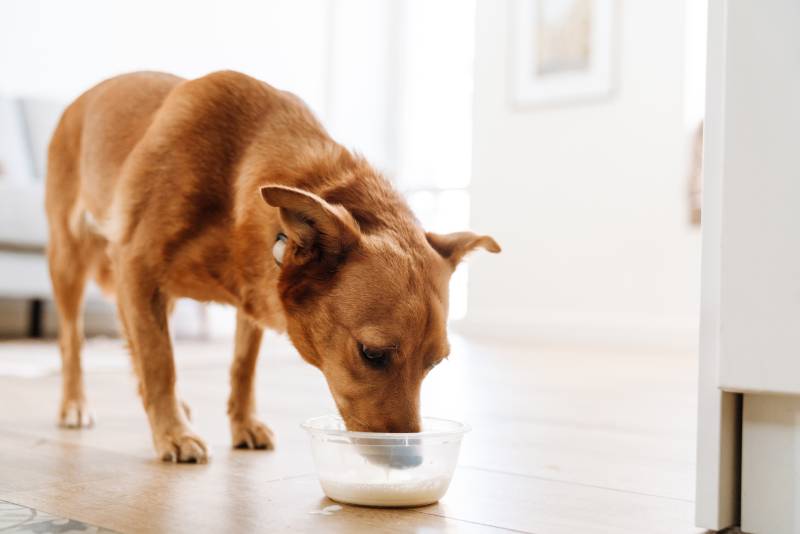
2. It’s a Great Source of Vitamin A
Goat’s milk is an excellent source of vitamin A, an essential vitamin that needs to be part of your dog’s diet to maintain optimal health.1 Your pup’s skin, coat, muscles, and nerves all need this vitamin to function as they should. Dogs with deficiencies in vitamin A will have an unhealthy-looking coat and skin and may even suffer from night blindness.
3. It’s Easy to Digest
Offering goat’s milk to your dog is a great way to help support its digestive system. Goat milk is easier to digest thanks to its smaller casein curd and fat globules. This leads to it being completely digested in your dog’s small bowel, leaving fewer leftovers which could potentially ferment in your pup’s large bowel, causing gas. Your dog’s body doesn’t have to work as hard to break down goat milk compared to other dairy products.
Some vets even use goat milk for pets with inflammatory bowel disease as it may help the gut heal. Of course, you don’t want to take it upon yourself to choose the best treatment plan for your dog if it has IBD. This is a discussion you need to have with your vet.
4. It Contains Protein
Goat’s milk is a great source of protein that your dog needs to form and maintain its cartilage, tendons, and ligaments. Protein also aids with muscle, skin, and hair health.
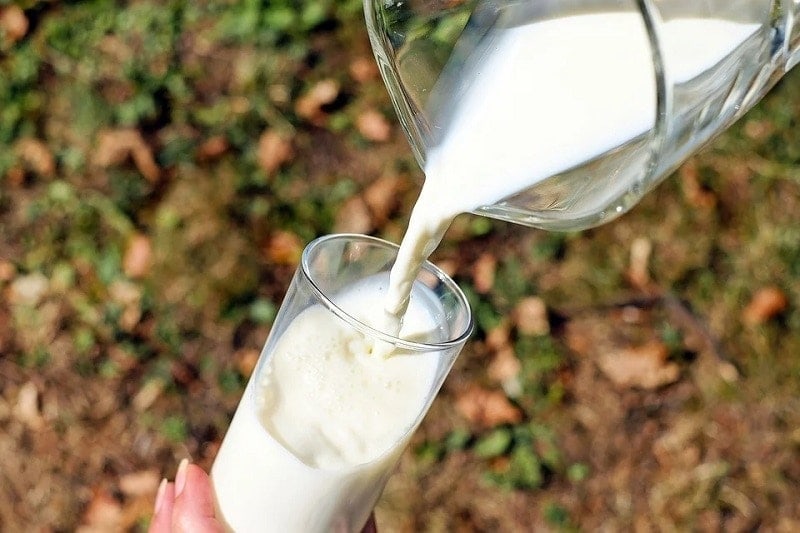
5. It Can Boost the Immune System
Approximately 70% of your dog’s immune system is associated with its gut. Since goat’s milk is so rich in probiotics, it may promote a stronger immune system, as your dog will have a better balance of gut bacteria.
6. It’s High in Calcium
Goat’s milk has more calcium than cow’s milk (330 mg versus 275 to 300 mg), which can benefit your pup in several ways. This mineral is necessary for proper growth, muscle building, and heart health. Dogs cannot produce calcium naturally, so it’s something that needs to be provided by their diet.
7. It’s Rich in B Vitamins
Goat’s milk is a great source of vitamins B3 (niacin) and B6 (pyridoxine).
Vitamin B3 is necessary for the proper functioning of more than 50 enzymes. It helps promote healthy skin and proper blood circulation. As with other B vitamins, B3 helps the nervous system function properly and aids in the metabolism of macronutrients.
Vitamin B6 is important for producing proteins, hormones, and neurotransmitters. It’s necessary for the absorption of fat and protein and the maintenance of sodium and potassium balance.
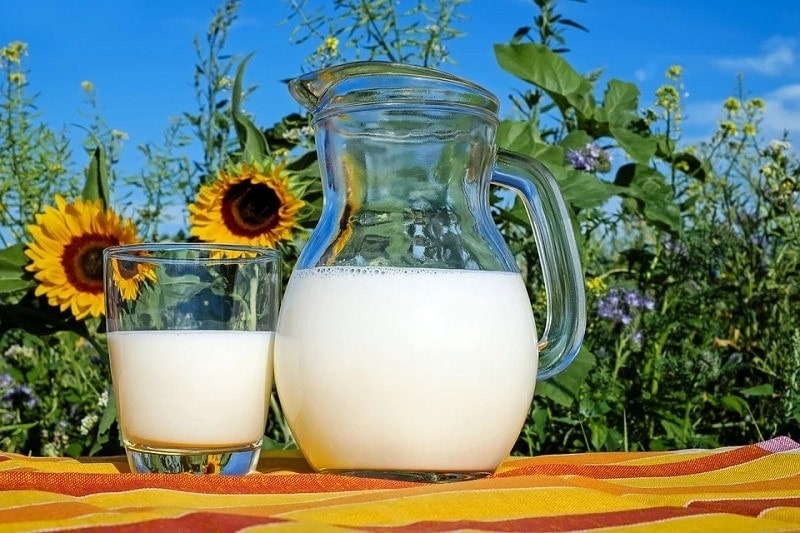
8. It’s Hydrating
Goat milk has the highest water content compared to milk from cows, buffalos, and sheep. Dogs need around an ounce of fluids per pound of body weight daily, and if your pup isn’t getting the proper amount from its water bowl, goat’s milk is a great way to increase its hydration levels.
9. It Can Help a Dog Gain Weight
Since goat milk is so high in protein and fat, vets sometimes recommend it to put weight on a dog that’s malnourished.
Types of Goat Milk
You can choose from several forms of goat’s milk on the market for your pup.
Pasteurized goat’s milk
By far the most common and convenient form. Because it’s pasteurized, any potentially pathogenic bacteria that could cause harm to your pup are removed.
Goat’s milk powder
Designed to be sprinkled over food or mixed with water. It is sometimes marketed toward puppies with sensitive digestive systems or those orphaned or rejected. Unfortunately, goat milk doesn’t provide the nutrients necessary for a growing puppy to thrive, so it should not be used as a replacement for puppy milk.
Raw goat’s milk
This milk hasn’t been pasteurized and is straight from the goat. The Centers for Disease Control and Prevention (CDC) says that raw milk can be contaminated with germs that can make you (or, in this case, your pets) very sick. However, numerous online sources tout the benefits of raw over pasteurized goat milk for dogs. Use your discretion when deciding if raw milk is the best option for your pup, and ensure you’re sourcing it from reputable sources. Better yet, get your vet in on the conversation to give them time to weigh in on the pros and cons of offering raw milk to your pup.

Should I Offer My Dog Goat Milk?
No peer-reviewed studies are currently available to prove or disprove the health benefits of goat’s milk for dogs. Most of what you’ll find online when researching is anecdotal from pet parents who have fed their dogs goat’s milk or marketing hype from manufacturers trying to sell their milk. However, pasteurized goat’s milk is probably fine to offer most dogs occasionally in small amounts. The key is small quantities to not unbalance your pup’s diet. If your dog has any underlying health issues, we recommend speaking to your vet before adding new foods (or drinks) to its diet.
What’s the Best Way to Offer Goat Milk?
There are several ways you can serve goat milk to your pet.
- Pour it into a bowl
- Serve it over kibble
- Use it as a healthy topper for wet or raw food
- Bake it into dog-friendly treats
- Make “pupsicles”
Are There Risks Associated with Goat’s Milk for Dogs?
Goat’s milk doesn’t come without its disadvantages, however.
- High fat content. It is higher in fat, which can be problematic if your dog has or is at high risk of developing pancreatitis. This inflammation of the pancreas will require a lower-fat diet.
- High calorie. Goat’s milk is also higher in calories than cow’s milk. One cup contains 170 calories, compared to a cup of cow’s milk at 90 to 150 calories. These additional calories can add up over time and cause your pup to become obese.
- Lactose. While cow’s milk contains more lactose, goat’s milk still contains lactose. Dogs can develop lactose intolerance, which may be exacerbated by a diet containing milk, be it cows or goats.
- Bacteria. Raw goat milk can expose your pup to several pathogens. If you occasionally give your pet goat’s milk, make sure you buy the pasteurized kind.
Final Thoughts
While goat’s milk appears to have some health benefits for dogs, no peer-reviewed studies prove or disprove its purported benefits. If you’re considering offering goat’s milk to your dog, we recommend discussing it with your veterinarian first. They will consider your dog’s current health status and history when making dietary recommendations.
See More:
Featured Image Credit: bublikhaus, Shutterstock





